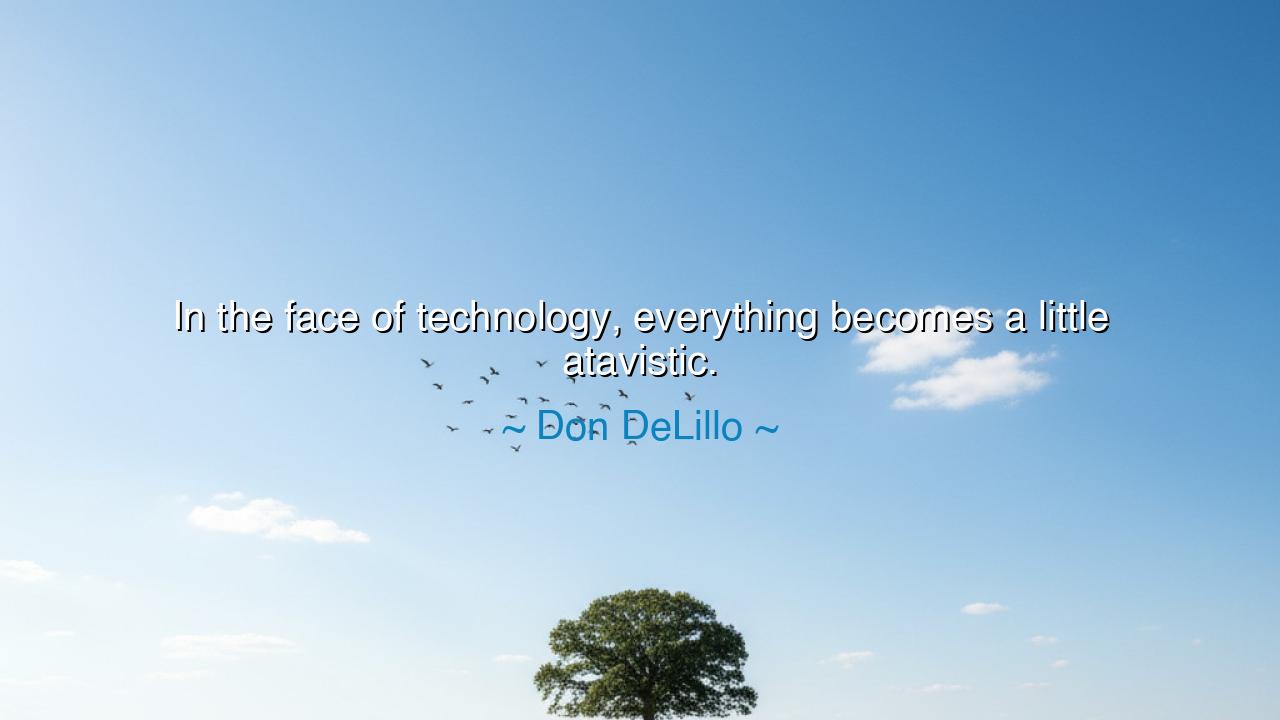
In the face of technology, everything becomes a little






Hear now the words of Don DeLillo, prophet of the modern age, who declared: “In the face of technology, everything becomes a little atavistic.” This saying, though wrapped in mystery, is a mirror held up to humanity. He reminds us that when we behold the dazzling might of our inventions, we are not made entirely new, but are cast back into something ancient, primal, and instinctual. In the glow of machines, in the hum of wires, the oldest fears and desires awaken within us, showing that beneath all progress, the primitive heart still beats.
For what is meant by atavistic? It is the return of something old, something buried, something ancestral. It is the re-emergence of instincts thought forgotten—fear, awe, wonder, rivalry. DeLillo speaks of this truth: that in confronting technology, whether it be the machine, the computer, or the network, men and women feel once more as their forebears did before the fire, the wheel, the sword. They stand trembling, filled with both terror and reverence, unsure whether this new gift is a blessing or a curse.
History offers many examples. When the printing press was first born, priests and rulers trembled at its power, fearing the masses would be unchained from ignorance. The tool was new, yet the fear was atavistic—a return to the primal anxiety of losing control, of knowledge slipping from the hands of the few to the many. Likewise, when electricity first lit the night, crowds gathered in awe as though watching lightning harnessed by mortals. Their wonder was ancient, their terror deeply human, though the invention was modern.
Consider also the splitting of the atom. Here was technology so advanced it seemed divine, yet the emotions it awoke were as old as war itself: fear of destruction, lust for power, reverence for forces beyond comprehension. Nations responded not with calm logic, but with tribal instincts, arming themselves, threatening rivals, guarding territory as though the world were still caves and clans. This is the truth DeLillo names: that every leap forward awakens in us echoes of the past.
Even in the quiet technology of our age—the screen, the Internet, the phone—the atavistic emerges. In the anonymity of networks, men hurl insults as warriors once hurled stones. In the endless sharing of stories, gossip returns with a speed not seen since tribes gathered around fires. The tools are advanced, but the patterns are ancient. We are at once modern and primordial, clothed in circuits but driven by instincts older than history.
The lesson is this: do not be deceived into thinking that technology alone makes us wise. It magnifies, it accelerates, it transforms, but it does not erase the primal heart. When we encounter new machines, new inventions, we must recognize the atavistic within us—the fear, the awe, the hunger for power—and guide it with discipline, lest it rule us. Awareness of our ancient instincts is the shield that prevents us from being consumed by them.
Practical counsel is clear. When faced with the new, pause. Ask yourself: What old instinct is stirring in me? Is it fear? Is it greed? Is it wonder? Recognize it, but do not let it command you. Use the wisdom of reflection to temper the passion of instinct. In this way, you will not be mastered by technology, but will master your own ancient heart in the presence of it.
Thus let DeLillo’s words resound: “In the face of technology, everything becomes a little atavistic.” For the new always awakens the old. To live well in this age is not to abandon our primal roots, but to hold them with awareness, shaping them with reason and compassion, so that our future may rise not as a return to barbarism, but as a union of invention and wisdom.






AAdministratorAdministrator
Welcome, honored guests. Please leave a comment, we will respond soon